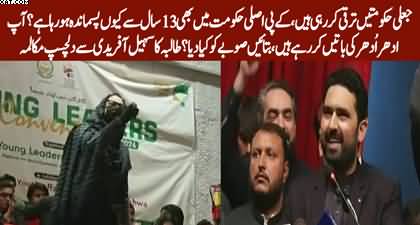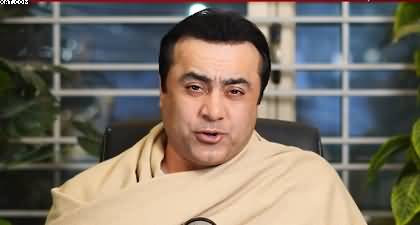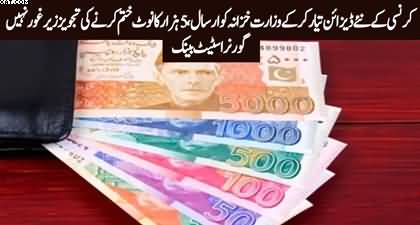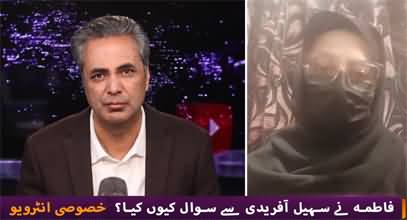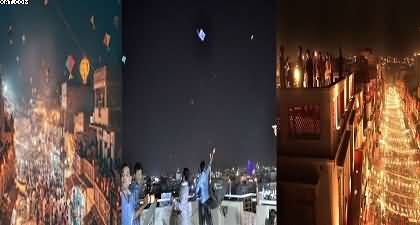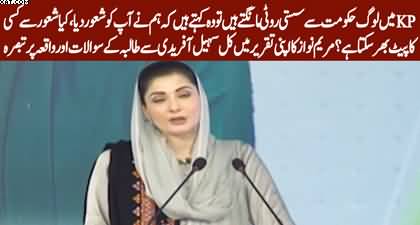My Wife Has Great Wisdom, I Discuss Every Political Issue with Her - PM Imran Khan

DER SPIEGEL: You recently remarried. The first lady, Bushra Bibi, is a well-known faith healer. Do you take her advice on political issues?
Khan: Only a fool doesn’t talk about everything with his wife. She has great wisdom. I discuss everything with her, also problems I face in government, dealing with complex situations. She is my soulmate. She is my companion. I would not have survived without her.
[COMPLETE INTERVIEW OF PM Imran Khan to German Magazin Spiegel]
Interview Conducted by: Susanne Koelbl
"India Is a Fascist State, Inspired by the Nazis"
Pakistani Prime Minister Imran Khan, 68, speaks about his country's role in global politics, his admiration for the Chinese leadership and the similarities he shares with U.S. President Donald Trump.
On a rise in the heart of Islamabad is the imposing residence of Pakistani Prime Minister Imran Khan, 68. It is here where he receives his visitors, and he enters the room wearing white traditional dress with a blue vest. The once easygoing cricket world champion and playboy has transformed himself into an earnest statesman who is currently facing numerous problems simultaneously. Pakistan's economy is struggling badly, the opposition has united against Khan and the powerful military, with which he cooperates closely, is severely restricting his room to maneuver. Currently, Khan's government is mediating the peace talks between the U.S. government and the Taliban, which have been hampered by repeated outbreaks of violence. The only glimmer of hope is provided by the relatively low numbers of coronavirus infections in the country.
DER SPIEGEL: Mr. Prime Minister, with around 6,700 deaths from COVID-19 in Pakistan, a country of 220 million inhabitants, in addition to far fewer infections, your country seems to be doing better than your neighbors. What are you doing differently?
Khan: Almost half of the Pakistani people live on daily and weekly wages. Therefore, we did a smart lockdown. We only restricted areas if we found that there was an outbreak, and we did not stop our supply lines. We did not stop the agriculture sector and quickly reopened the construction sector, because that's what employs the most people in the urban areas. That saved us. India instead restricted people to their homes in poor areas - a complete lockdown. They have a lot of poverty now, same in Iran.
DER SPIEGEL: How many people are tested for the coronavirus every week? Does your government have a clear picture of the pandemic in the country?
Khan: Around 180,000 to 200,000 people are getting tested every week and our national coordination team looks at multiple statistics and has a very clear composite picture of the epidemic. From peak numbers in June, we saw a steady decline in cases, positivity and deaths across the country until late August. Now, we're hoping to survive the second wave.
DER SPIEGEL: The U.S. election is just a few days away. Who do you think has a better chance of winning, Donald Trump or Joe Biden?
Khan: Joe Biden is in front in the opinion polls, but Donald Trump is very unpredictable, because he's not like normal politicians. He plays by his own rules.
DER SPIEGEL: It sounds like you admire that.
Khan: As a politician who started his own party and then built it up into the biggest party in Pakistan over 22 years, I also had to do a lot of out-of-the-box-thinking. We were the first to rely on social media and the first to attract the youth to our rallies.
DER SPIEGEL: Do you see similarities between yourself and Trump?
Khan: We had to be very unorthodox, and in some ways, Donald Trump does too.
DER SPIEGEL: Who you would prefer to work with?
Khan: What we really want from the U.S. is evenhanded treatment with respect to India, especially with the dispute in Kashmir. The region is a hotspot, it could flare up at any time. That's why we expect the U.S., as the strongest country in the world, to be even handed, whoever becomes president. The U.S. thinks India will contain China, which is a completely flawed premise. India is a threat to its neighbors, to China, Bangladesh, Sri Lanka and to us. It has the most extremist, racist government on the subcontinent. It is a fascist state, inspired by the Nazis in the 1920s and '30s.
DER SPIEGEL: That is a rather extreme comparison. Are you not exaggerating?
Khan: Read the writings of the Rashtriya Swayamsevak Sangh (RSS), the intellectual forerunner of Prime Minister* Narendra Modi's party. They openly admired Hitler. The Nazis wanted to get rid of the Jews. The RSS wanted to rid India of the Muslims.
DER SPIEGEL: You have said on several occasions that Washington forced Pakistan into a misguided war in neighboring Afghanistan. Can you explain that for us?
Khan: Pakistan had nothing to do with the terror attacks on 9/11. Al-Qaida was in Afghanistan. After 9/11, we should not have allowed our army to become involved in the war. I opposed it from day one. The U.S. put pressure on us, and the military dictator Pervez Musharraf succumbed to that pressure.
DER SPIEGEL: At the time, Pakistan, Saudi Arabia and the United Arab Emirates were the only countries supporting the Taliban. Osama bin Laden had already been designated an international terrorist by then and the Taliban were hosting him.
Khan: Don't forget, Osama bin Laden was a hero in the 1980s. He supported the Mujahedeen against the Soviets in Afghanistan, and he was backed by both the CIA and Pakistan.
DER SPIEGEL: That was long before 9/11. Much had changed after that.
Khan: It was Pakistan's right to recognize the Taliban, but Pakistan had no control over the Taliban. When Pakistan asked the Taliban to hand over Osama Bin Laden to the Americans, they refused.
DER SPIEGEL: Trump officially thanked you recently for helping bring the Taliban to the negotiating table. How did you manage to do so if, as you claim, Pakistan has no close links with them?
Khan: With 2.7 million Afghan refugees in Pakistan, we have a certain amount of leverage, which we used to the utmost. I am very pleased that we succeeded.
DER SPIEGEL: It looks as though the Taliban are on the cusp of a military victory over the Kabul government after securing a peace deal with the U.S. At the same time, they are pretending to negotiate with government representatives. Is your neighboring country of Afghanistan at risk of sliding back into a dictatorship run by brutal fundamentalists?
Khan: I'm afraid no one can predict which way things will go in Afghanistan right now. What I can say is that after Afghanistan, the country that wants peace most is Pakistan. We have lost 70,000 people in this conflict, and our tribal areas adjacent to the Afghan border have been devastated in the last 15 years. Half of the people in these areas have become internally displaced, about 1.5 million of them - victims of the conflict between the Pakistan Taliban and the army. From day one of my government, we have been fostering dialogue.
DER SPIEGEL: You recently received a well-known radical Mujahedeen leader from Afghanistan, Gulbuddin Hekmatyar. You allegedly discussed a power-sharing deal between him and the Taliban once the U.S. troops withdraw. What was your advice for him?
Khan: Gulbuddin Hekmatyar took part in the elections in Afghanistan and he accepts the constitution of Afghanistan.
DER SPIEGEL: That is difficult to believe.
Khan: Prior to speaking with him, I spoke with Dr. Abdullah Abdullah, who leads the High Council for National Reconciliation (HCNR) in Afghanistan. We have no favorites in Afghanistan. Our only interest is that the future government in Kabul does not allow India to operate from there against Pakistan.
DER SPIEGEL: For years, Pakistan has been accused of playing a double game, using militants to operate in Kashmir and other places while using the Taliban to keep India out of Afghanistan. What is your response to such accusations?
Khan: It's very unfortunate that Pakistan was given this image. It all started in the 1980s, after the Iranian revolution. Many in the West began looking at Muslim countries as if there was a divide between liberals and fundamentalists - a very artificial assessment. Muslim countries are no different from other communities. All communities are divided into moderates, which make up the majority, and the extremists.
DER SPIEGEL: Soon, a new law will be implemented prohibiting criticism of the country's powerful military. Is this the end of freedom of speech in your country?
Khan: Pakistan has more freedom of speech than almost any Western country. And I use the word freedom very carefully, after having spent almost two decades of my life in England, where they have very strong laws on slander. There was a defamation case between me and an English cricket star that I won, because defamation laws are very strong there. But such slander laws don't exist in Pakistan. I have been wrongly slandered as prime minister, here and gone to court, but even as prime minister, I haven't been able to get justice.
DER SPIEGEL: This new law, though, only protects the security apparatus. It seems it's not so much about the truth as it is about what the military defines as defamation.
Khan: As long as criticism is based on truth and facts, it will be accepted. Every day, our security forces lose people in battle. Every country protects its institutions, not when they do something wrong, but when they're being attacked.
DER SPIEGEL: The new law could make it impossible for journalists to report on the army in the future.
Khan: There will be another way of dealing with the security forces – not through the media, but through the government. I will speak to the army chief if I think there's something wrong. There are always human rights violations in military operations and sometimes we speak about it when it happens. But this should not be done in public. When soldiers are risking their lives, you cannot demoralize them in public.
DER SPIEGEL: The Middle East is currently undergoing a profound transformation. Two rival regional powers, Saudi Arabia and Iran, are the driving forces behind proxy wars in Yemen, Syria and elsewhere. You have offered to mediate between these two countries. Have you seen any progress?
Khan: When I came to power, I immediately offered to mediate in Yemen. Such a colossal human rights disaster is going on there. I spoke to Iran and then I spoke with Mohammad bin Salman, the crown prince of Saudi Arabia. But you can´t force anybody to agree on peace talks if they don´t want to.
DER SPIEGEL: Can you imagine Riyadh and Tehran going to war directly?
Khan: It would be a disaster. It would be devastating for countries all over the world, especially the poor, and the price of oil would shoot up.
DER SPIEGEL: The United Arab Emirates, Bahrain and Sudan have established relations with Israel, with Saudi Arabia potentially following suit. Is Pakistan next?
Khan: Every country has its own foreign policy priorities. They have to think about their own people, and it's their decision. As for Pakistan, the founder of the nation, Muhammed Ali Jinnah, a brilliant man, spoke in the 1940s about the Palestinian situation as a huge violation of human rights. Pakistan still takes this view. Unless there's a just settlement, we cannot recognize Israel.
DER SPIEGEL: You have often praised the one-party system in China spoken of the country as an economic example for Pakistan to follow. Why is that?
Khan: What China has achieved is remarkable. I admire China because they have taken 700 million people out of poverty within the short period of 40 years. This is the model I want to emulate in Pakistan. Despite not having electoral politics, they are good at bringing the best people to the top in their country. It’s a system based on meritocracy. I've seen how the Communist Party sort of sifts through all the talent and bring it to the top. Furthermore, in the past seven years, China has put 450 ministerial level officials in jail on corruption charges.
DER SPIEGEL: What conclusions do you draw from that?
Khan: Countries aren't poor because of a lack of resources. It's because of corruption among the leadership. As we know from the Panama Papers, the same is true for Pakistani politicians. Millions of dollars went into properties in the most expensive areas in London, siphoned off from this country.
DER SPIEGEL: Some of these politicians have joined forces to push you and your government out of office. Do you fear them?
Khan: Not at all. I expected it. They want to blackmail me into getting them off the corruption cases. But there’s no way I will ever relent. Look, we are facing the biggest trade gap in our history. Our imports were $60 billion, but exports were only $20 billion. The rupee is falling and there's inflation because we import fuel. Everything is getting more and more expensive, even electricity. We have to raise our revenues, so we have to increase our tax base. We're going through these painful reforms and all these guys from the opposition get together. They are worried that once we stabilize things, they will all end up in jail because of huge corruption cases.
DER SPIEGEL: You recently remarried. The first lady, Bushra Bibi, is a well-known faith healer. Do you take her advice on political issues?
Khan: Only a fool doesn’t talk about everything with his wife. She has great wisdom. I discuss everything with her, also problems I face in government, dealing with complex situations. She is my soulmate. She is my companion. I would not have survived without her.
DER SPIEGEL: Prime Minister, thank you very much for this interview.
Soure: Spiegel
Top Rated Posts ....
 Kasur: Brave citizen resists robbery and shots the robber after snatching his gun
Kasur: Brave citizen resists robbery and shots the robber after snatching his gun
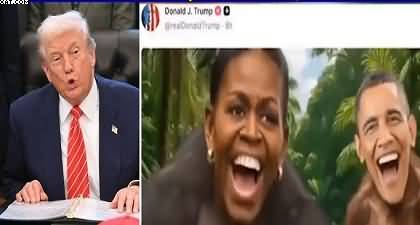 Donald Trump refuses to apologize for posting insulting video of Obama and his wife
Donald Trump refuses to apologize for posting insulting video of Obama and his wife
 New York Times exposes India’s dominance in cricket
New York Times exposes India’s dominance in cricket
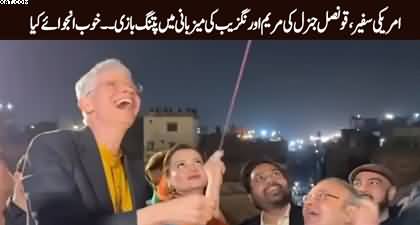 US Ambassador & Consul General enjoy kite flying in Lahore
US Ambassador & Consul General enjoy kite flying in Lahore
 Chinese man extracts 191 grams of gold from discarded SIM cards
Chinese man extracts 191 grams of gold from discarded SIM cards
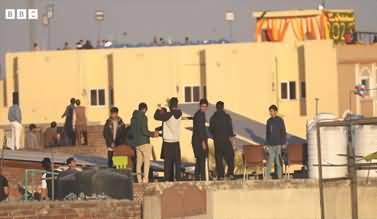 Kites Fill the Skies as Basant Festivities Continue in Lahore
Kites Fill the Skies as Basant Festivities Continue in Lahore

Advertisement
Popular Posts
Interesting questions by female student from CM KPK Suhail Afridi
Views 1126 | February 03, 2026China unveils world’s first ‘Biomimetic AI Robot Moya’
Views 881 | February 06, 2026Najam Sethi's explosive interview on Indian television, Trump angry on CNN female reporter - Details by Mansoor Ali Khan
Views 678 | February 05, 2026Kasur: Brave citizen resists robbery and shots the robber after snatching his gun
Views 658 | February 08, 2026State bank approves new currency note designs
Views 634 | February 05, 2026Karachi: CCTV footage of 130 million rupees robbery 'the biggest' robbery of 2026
Views 585 | February 04, 2026Talat Hussain's exclusive talk with female student Fatima who criticized CM Sohail Afridi
Views 560 | February 05, 2026Basant begins in Lahore, Festive scenes with Bhangra and Dance
Views 558 | February 06, 2026Donald Trump refuses to apologize for posting insulting video of Obama and his wife
Views 532 | February 08, 2026Maryam Nawaz comments on the student's tough questions with Sohail Afridi yesterday
Views 501 | February 04, 2026Comments...

